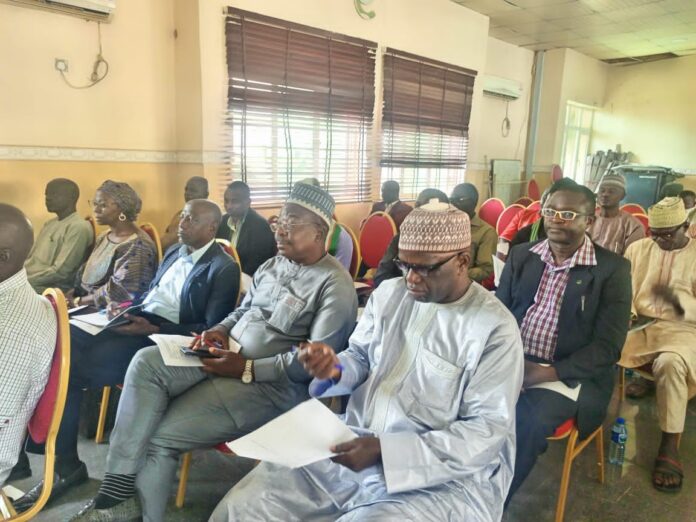Some communities representatives at a sensitisation on child trafficking.
By Marie-Therese Nanlong
Jos – Worried by the alarming rate of gender-based violence, child trafficking, and neglect, the Plateau State Gender and Equal Opportunities Commission on Thursday sensitised Ethnic Development Associations in the State on the dangers of the menace.
The Commission charged the participants who were drawn from the various ethnic groups in the State to be vigilant and assist in curbing the menace that is harming the future of the youths and giving the State a bad image.
Recently, there has been an upsurge in the number of young people from Plateau State trafficked to places within and outside the country, and the Commission, working with the State Ministry of Women Affairs and Social Development, the National Agency for the Prohibition of Trafficking in Persons, NAPTIP, relevant non-governmental organisations, and others to repatriate the victims.
The Chairperson of the Commission, Barr. Olivia Dazyam said all stakeholders must collaborate to combat gender-based violence, child trafficking, and child neglect and stressed the engagement is targeted towards building the capacity of communities’ leaders to play crucial roles in reversing the trend.
Her words, “Trafficking has become a pandemic in Plateau State and we have handled many alarming cases since the inception of this government. According to statistics from the National Bureau of Statistics, Nigeria Child Labour Survey 2002 sponsored by the International Labour Organisation, Plateau State is 4th with child labour indices which is alarming.
“Parental abandonment of responsibilities towards their children and family is an offence under our law and can not be accepted. The benefits of engaging ethnic development associations are to increase awareness and sensitisation in local communities.
READ: Plateau group tells residents to heed order against blocking roads
“Use culturally sensitive approaches to addressing GBV, child trafficking, neglect and abandonment of family responsibilities, strengthen community resilience and support systems, and emphasize the importance of a coordinated and holistic approach to addressing the issues.”
Dazyam maintained that “Ethnic Development Association leaders have a unique platform and the ability to reach vast populations in their communities through ethnic development meetings and programmes.
“They can use that platform to help disseminate messages that focus on social welfare protection and challenge gender-based violence, trafficking, neglect and abandonment of family responsibilities, gender equity, and harmful traditional practices. Their support is essential in transforming attitudes and behaviours towards gender equality.”
She took time to explain the provisions and punishments in the Gender and Equal Opportunities Laws, the Violence Against Persons Prohibition Laws, and the Child Rights Law, 2005, and stressed the government is determined to use the provisions of the laws to punish the violators and abettors of the laws.
In their responses, the diverse leaders asked questions and narrated their experiences in combating the menace, calling for stiffer punishment for those caught in the act.
















